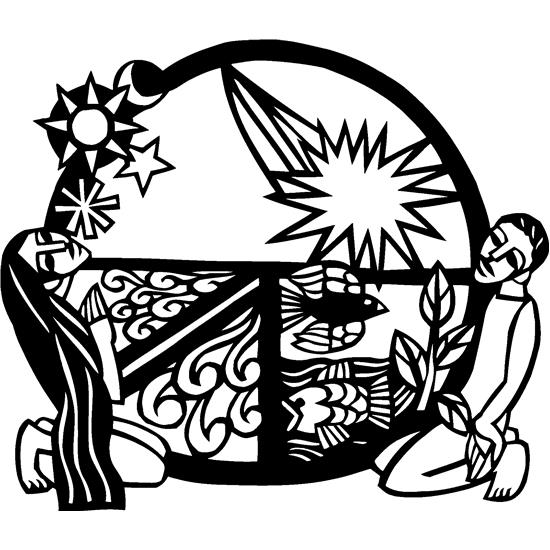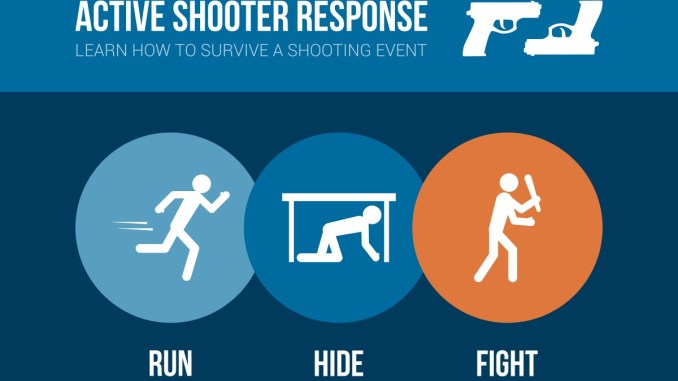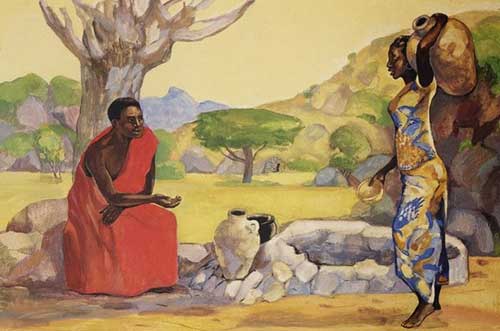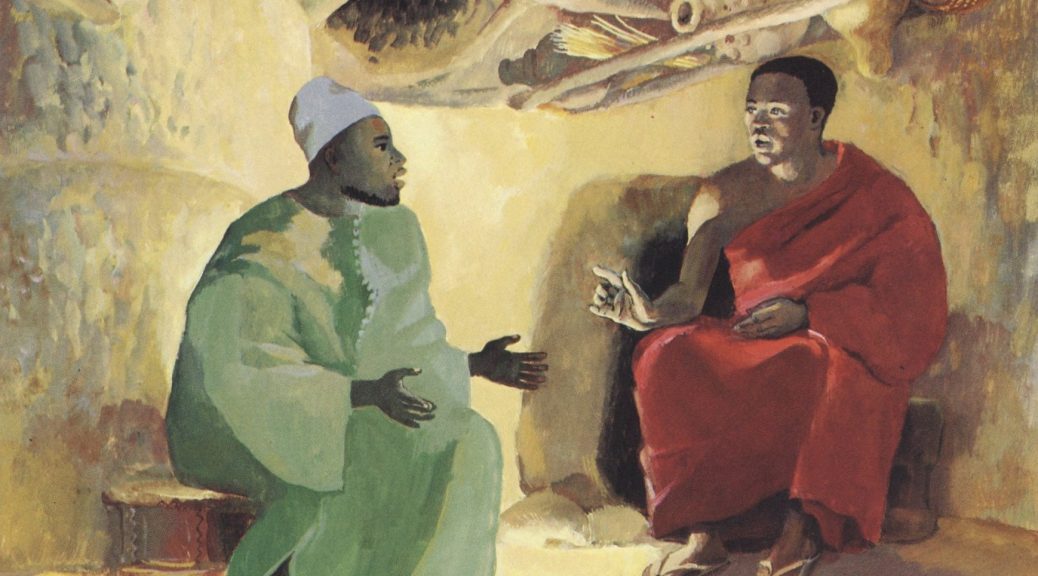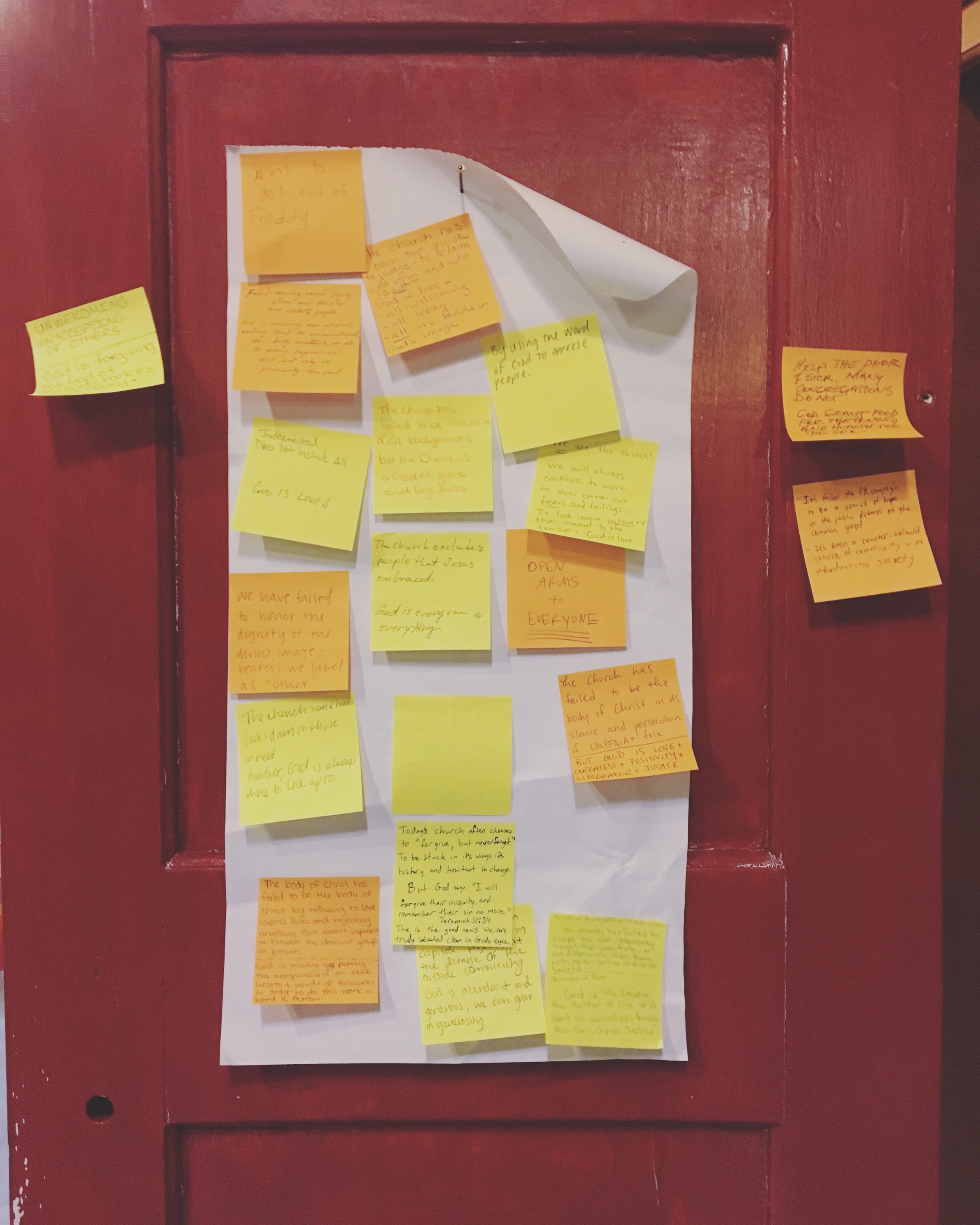Holy Food for Holy People
Our Sacred Story this week comes from Acts 10:9-16
9 About noon the next day, as they were on their journey and approaching the city, Peter went up on the roof to pray. 10He became hungry and wanted something to eat; and while it was being prepared, he fell into a trance. 11He saw the heaven opened and something like a large sheet coming down, being lowered to the ground by its four corners. 12In it were all kinds of four-footed creatures and reptiles and birds of the air.13Then he heard a voice saying, ‘Get up, Peter; kill and eat.’ 14But Peter said, ‘By no means, Lord; for I have never eaten anything that is profane or unclean.’ 15The voice said to him again, a second time, ‘What God has made clean, you must not call profane.’ 16This happened three times, and the thing was suddenly taken up to heaven.
So I have this really bad habit I need to confess. Every time some stranger tells me that the bible says you shouldn’t have tattoos, I all too quickly clap back with a smart remark about how the Torah also prohibits poly-cotton blend clothing and bacon…so there!
It’s all the mental energy a comment about my body from a stranger warrants, but it’s also an unfair trivialization of the important thing that God is doing in giving the people of Israel a distinct way of being. That’s what the “food laws” of the Torah, the law, the rule of life…given by God to the Hebrews is about. For the Jewish people there are two kinds of food…clean and unclean. Unclean food wasn’t just stuff that was taboo or unliked, but was understood to actually cause separation between God and God’s people. In this same tradition there are also two kinds of people, Jews…and everybody else, aka the Gentiles. Jewish identity, even in the early church because “Christian” identity was just being born, Jewish identity and even our identity today is shaped by an understanding of what we are and what we are not. There are several theories as to why God gave the people these food laws – sanitation, distinction from other tribes, their symbolical meanings…
But we can’t conclusively say why. What we do know is that food is important. The kinds of food we eat, the way its prepared, means something.
So it’s not just about Peter not being able to eat duck or bacon…food is always about more than food. Where it comes from matters. Our food tells a bigger story.
For instance, in my family and many other Texas families…we are anchored by barbecue - brisket, in particular. And while you will now pay a hefty price or wait in hours-long lines for a pound of the good stuff, this meat has a much humbler origin. Meat is always one of the more expensive items in the food pyramid and is still a luxury for many. But among the cheapest cuts of meat is this tough section from the cow’s chest…part of which is what we call a brisket. So, as a cheap cut of beef….it’s what simple immigrant farmers like my ancestors from 100 plus years ago could afford. And the only way to make that tough meat taste decent is to render it down, low and slow with smoke over a matter of hours on end. Our food is about more than food, it tells a bigger story. And we could tell a similar story about how ham hocks, fatback and cooked collard greens became staples of cuisine to black Americans. A couple years ago the University of Kentucky even launched a course called Taco Literacy which explores how the history of food is intertwined with politics, migration, socioeconomics and justice. Our food is never just food. We begin to see that this story is much bigger.
So let’s take a wide angle view. We have to go back to the beginning, to Genesis. The first chapter depicts 7 days of God establishing the conditions for life to thrive. After each day, God looks upon creation…all of it…and calls it good. Even humanity is given the Hebrew name Adamah which is a word that means ground, earth, soil…but also closely tied for the word, “to make.” The word takes on the meaning of one made from earth. It as if the ancient storytellers were keenly aware of our innate connection to the ground and its cultivation. Ultimately, God entrusts all these things to humanity to tend to and care for. God points to how this will provide food for humanity and food for our food. We were designed to be deeply connected to the earth, it’s care, where our food comes from. After a full 7 days, creation is established as a bountiful garden.
Now let’s zoom back in to Peter and the Acts of the Apostles. Peter has this vision about food, but there’s something else going on. To understand where this vision is going, we have to look at what just happened. In the 8 verses prior, a generous and faithful person named Cornelius (not a Jew), ALSO sees a vision…telling him to find this guy Peter and so he sends out some scouts to do that. Peter’s vision comes directly AFTER Cornelius’, so we could start to assume that these visions will probably collide sometime soon.
And they do. The verses just after Peter’s vision tell us that as he is wondering about what THAT was all about (the bible says he was brooding about it), the Spirit causes Peter to notice the scouts sent by Cornelius and brings them together. Peter returns with them to Cornlius’ house, where Cornelius has gathered all his family and friends…all not Jewish, not part of what Peter understood as his tribe, his people. Then we read this:
27And as he (Peter) talked with him, he went in and found that many had assembled; 28and he said to them, ‘You yourselves know that it is unlawful for a Jew to associate with or to visit a Gentile; but God has shown me that I should not call anyone profane or unclean.
The food stuff still matters, they will still have to share a meal that crosses cultural and religious boundaries…but it’s also about more than food, it’s about people. The separations that were helpful and meaningful at one time now cause harm to what God is doing in the world. Our relationship to food, to stuff, to creation, affects our relationship with people. But this isn’t a story about being polite, about hospitality and being a generous guest willing to try new foods. This is a story about honoring God and God’s creation of another. Paying attention to the things on our plate and where it comes from isn’t about what we “should” do because it’s “right,” it’s about what and whom God cares about, and what and whom we are invited to care about too.
On my trip these past weeks in Turkey and Greece, we visited some of the oldest Christian buildings, and curiously some of them are shaped as octagon, and 8-sided figure. Why did they do this? Besides making it impossible to arrange furniture? Just as 7 represents the number of creation, of completion and wholeness...now 8 represents the resurrection world that is newly dawning. The new creation with a Jesus as the firstborn, the new adamah, the one formed from a new kind of earth, a new reality which is promised, a new beginning that we are given. This new creation restores the realization that humanity,YOU!, along with the rest of the animals and growing things, are deeply connected in one large ecosystem. That what affects one part, affects the whole.
Christ is risen! Alleluia! A new day is here! Alleluia! It is for you and for me! Alleluia! It is for all of creation! Alleluia! Living in light of this resurrection, living as Easter people then gives us new eyes for connection. I’ve read some who say that the next world war….will be not be fought petroleum, but over water. They say that the effects of global warming and it’s implication for access to water and thus agriculture and our very existence…will lead us to violence if left unchecked. Our attention to creation is not only a religious issue, but a justice issue. Where our food comes from matters because creation matters. Our care of creation matters because humanity is innately connected to the earth and to each other. Humanity matters because God has declared all of it, YOU, good and holy, clean…again and again. Amen.
Challenge practices:
a) Visit a local urban farm/garden like Urban Harvest or Plant it Forward.
b) Learn about Texas’s water plan - http://www.twdb.texas.gov/waterplanning/swp/2017/
c) do your grocery shopping at Central City Co-op on Wednesday to enjoy the bounty of local farmers.


